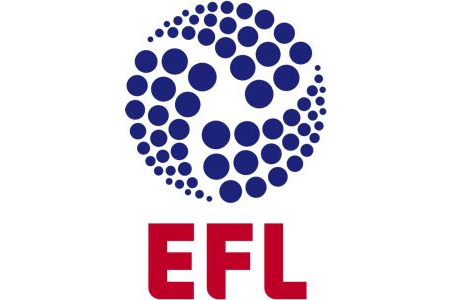 The top division in English Football is the Premier League, which is one of the wealthiest and most watched leagues on the planet. Below the Premier League in the English pyramid are the three English Football League (EFL) divisions which are the Championship, League One and League Two.
The top division in English Football is the Premier League, which is one of the wealthiest and most watched leagues on the planet. Below the Premier League in the English pyramid are the three English Football League (EFL) divisions which are the Championship, League One and League Two.
Originally, all four were part of the English Football League with divisions one to four. In 1992/93 the teams in Division One formed a breakaway Premier League, with an agreement to have promotion and relegation to and from the newly formed First Division which is now the Championship. The Premier League consists of 20 teams, with each of the EFL leagues containing 24 teams each, meaning a total of 92 teams.
Despite different governing bodies, these four professional divisions are often still referred to as the ‘league clubs’. Below these in the pyramid are the non-league divisions starting with the National League, which has promotion and relegation to and from League Two.
English Football Leagues
| League | Teams | Promotion | Relegation | Matches | Ave Salary |
|---|---|---|---|---|---|
| Premier League | 20 | n/a | 3 | 380 | £60,000 / Week |
| Championship | 24 | 3 | 3 | 552 | £29,000 / Week |
| League One | 24 | 3 | 4 | 552 | £4,800 / Week |
| League Two | 24 | 4 | 2 | 552 | £2,220 / Week |
Premier League
| Team | Town | Stadium | Capacity |
|---|---|---|---|
| Arsenal | London (Holloway) | Emirates Stadium | 60,704 |
| Aston Villa | Birmingham | Villa Park | 42,682 |
| Brentford | London (Brentford) | Brentford Community Stadium | 17,250 |
| Brighton & Hove Albion | Brighton | Falmer Stadium | 31,800 |
| Burnley | Burnley | Turf Moor | 21,944 |
| Chelsea | London (Fulham) | Stamford Bridge | 40,834 |
| Crystal Palace | London (Selhurst) | Selhurst Park | 25,486 |
| Everton | Liverpool (Walton) | Goodison Park | 39,414 |
| Leeds United | Leeds | Elland Road | 37,792 |
| Leicester City | Leicester | King Power Stadium | 32,312 |
| Liverpool | Liverpool (Anfield) | Anfield | 53,394 |
| Manchester City | Manchester (Bradford) | Etihad Stadium | 55,017 |
| Manchester United | Manchester (Old Trafford) | Old Trafford | 74,140 |
| Newcastle United | Newcastle upon Tyne | St James’ Park | 52,305 |
| Norwich City | Norwich | Carrow Road | 27,244 |
| Southampton | Southampton | St Mary’s Stadium | 32,384 |
| Tottenham Hotspur | London (Tottenham) | Tottenham Hotspur Stadium | 62,850 |
| Watford | Watford | Vicarage Road | 22,200 |
| West Ham United | London (Stratford) | London Stadium | 60,000 |
| Wolverhampton Wanderers | Wolverhampton | Molineux Stadium | 32,050 |
About the Premier League
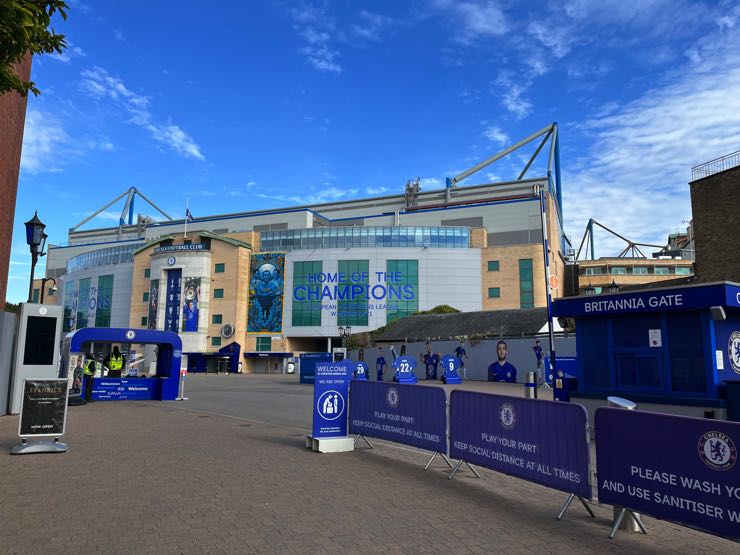
- Number of Teams – 20
- Number of Relegation Places – 3
- Total Number of Matches Per Season – 380
- Average Player Salary – Around £60,000 a week
As the very top league in the land, the Premier League features no promotion spots, only relegation. There is plenty of incentive to finish high up the league though, even if a title challenge is out of the question. Clubs that finish in the top four positions by the end of the season will book a place in the group stages of the Champions League. The only caveat to this is if English teams that finish outside the top four win both the Champions League and Europa League. This is because one of the prizes for winning either is a Champions League spot the following year. Should this fairly unlikely scenario happen then it would mean the team that finishes fourth would play Europa League football as there can only be a maximum of five English representatives in any given Champions League campaign.
‘Race for the Top Four’
With the top four spots unlocking Champions League fame and riches, you will often hear ‘race for the top four’ discussed in Premier League circles. Finishing just outside these places does not leave clubs empty-handed, however. Instead, the side finishing fifth will be guaranteed a place in the following year’s Europa League group stages. The other English Europa League spot is reserved for the winner of the FA Cup, but as this is regularly won by a side finishing in the top four, the slot instead goes to the side that finishes sixth in the league.
Surprise FA Cup Champion
Sometimes there will be a surprise FA Cup champion who subsequently receives a very rare taste of football on the continent though. A notable example was Wigan who won the FA Cup in 2013 before being relegated, meaning they participated in the Europa League while being in the Championship. In the past, there would be three Europa League places handed to English teams, (fifth place, sixth place and FA Cup winner or seventh place) but now there are only two following the creation of a new tournament. UEFA rolled out the Europa Conference League in the 2021/22 season with one spot allocated to an English side, the winner of the League Cup. The rules stipulate that if the League Cup winner ends up qualifying for another European competition, then the spot will go to the highest-ranked team in the league lacking continental football (sixth or seventh).
Point Secure Survival
This is life at the upper end of the Premier League but at the bottom, clubs are not thinking about European adventures. Instead, they are simply focused on securing survival. The Premier League provides clubs with supreme wealth and this is money clubs are desperate not to give up. It is often said that the 40-point mark is what struggling sides need to aim for to effectively guarantee their Premier League survival. In reality though, the actual total of points needed for safety tends to be somewhat lower. Across the five seasons from 2016/17 to 2020/21, the points amassed by the team finishing in 18th place – as so the highest of the sides to be relegated – were as follows: 28, 34, 34, 33, 34. The last time a team was relegated after reaching the fabled 40-point mark was West Ham all the way back in the 2002/03 campaign.
To elaborate a little more on relegation, teams that finish the season placed 20th, 19th and 18th are banished to the Championship. It is extremely common that at least one of the relegated sides is one of the clubs that secured promotion the season before. Between 2006/07 and 2020/21, only twice did all three promoted sides manage to avoid immediate relegation. On the flip side though, during the same period there was always at least one newly promoted outfit that secured Premier League survival at the first time of asking.
Three relegation spots have been part of the Premier League ever since its foundation in 1992 with the exception of the 1994/1995 season. During this particular season, Crystal Palace were sent down despite finishing fourth from bottom due to a slight restructuring of the league. At the time the English top-flight had 22 teams but the plan was to reduce this to 20. To make this possible, an extra team was relegated from the Premier League and only two clubs were promoted from the second tier, rather than the usual three.
Championship
| Team | Town | Stadium | Capacity |
|---|---|---|---|
| Bournemouth | Bournemouth | Dean Court | 11,364 |
| Barnsley | Barnsley | Oakwell | 23,287 |
| Birmingham City | Birmingham | St Andrew’s | 29,409 |
| Blackburn Rovers | Blackburn | Ewood Park | 31,367 |
| Blackpool | Blackpool | Bloomfield Road | 17,338 |
| Bristol City | Bristol | Ashton Gate Stadium | 27,000 |
| Cardiff City | Cardiff | Cardiff City Stadium | 33,280 |
| Coventry City | Coventry | Coventry Building Society Arena | 32,609 |
| Derby County | Derby | Pride Park Stadium | 33,600 |
| Fulham | London (Fulham) | Craven Cottage | 19,359 |
| Huddersfield Town | Huddersfield | Kirklees Stadium | 24,500 |
| Hull City | Kingston upon Hull | MKM Stadium | 25,400 |
| Luton Town | Luton | Kenilworth Road | 10,356 |
| Middlesbrough | Middlesbrough | Riverside Stadium | 34,742 |
| Millwall | London (South Bermondsey) | The Den | 20,146 |
| Nottingham Forest | West Bridgford | City Ground | 30,446 |
| Peterborough United | Peterborough | London Road Stadium | 15,314 |
| Preston North End | Preston | Deepdale | 23,404 |
| Queens Park Rangers | London (White City) | Loftus Road | 18,439 |
| Reading | Reading | Madejski Stadium | 24,161 |
| Sheffield United | Sheffield | Bramall Lane | 32,050 |
| Stoke City | Stoke-on-Trent | bet365 Stadium | 30,089 |
| Swansea City | Swansea | Swansea.com Stadium | 21,088 |
| West Bromwich Albion | West Bromwich | The Hawthorns | 26,850 |
About the Championship

- Number of Teams – 24
- Number of Promotion Places – 3
- Number of Relegation Places – 3
- Total Number of Matches Per Season – 552
- Average Player Salary – Around £29,000 a week
Although the English Championship provides three teams with the opportunity to escape and join the Premier League every season, this is something far easier said than done. Fiercely competitive, it is a division many clubs struggle to get out of. At the time of writing, there were eight clubs that had endured at least nine consecutive seasons in the Championship since its formation in 2004. By contrast, in League One and League Two, only five clubs had ever stayed in either division this long over the same period. Nottingham Forest perhaps know this more than most as since clinching promotion to the second tier in 2007/08, they have remained a part of Championship furniture ever since.
It was only the format of the Championship that denied Forest from securing promotion to the Premier League in 2010 though. The Reds finished third that year and with three promotion spots available, you might think that would have been good enough. The Championship however only provides guaranteed promotion spots to the top two sides. As for the remaining promotion place, this is determined by a play-off contested by the four teams that finish between third and sixth. So, it is possible that the sixth-best side in the league ends up being the one to clinch promotion. This does not happen too often mind you, Blackpool being the last team to do so in 2009/10.
Play-Offs
For the team that finishes third, the play-offs can often feel unjust because the third-best club can miss out on promotion to a team they outperformed during the regular season. It is hard to deny though that it adds an extra element of competitiveness to the league. There is always an intense and closely contested fight for the play-off spots, something that often goes right down to the final game of the regular season. Then you have the play-offs themselves which are engrossing affairs given how much there is on the line.
It is estimated that the play-off final, usually played in front of a sell-out Wembley crowd, is the richest single football game on the planet. In 2021, Brentford secured a minimum payout of £170m as they bested Swansea 2-0 and ended a 74-year absence from the English top-flight. The play-offs themselves work in the same fashion every year with the side that finished third in the table facing the side that finished sixth, and the fourth-placed side facing the fifth-placed side in two-legged semi-finals. Each semi-final leg takes place at the home grounds of the teams involved, with the team that finished lower hosting the first semi-final leg.
This is designed to give a slight advantage to the highest placed teams as in the event the tie goes to extra time, they will have an extra 30 minutes in front of their own fans. The away goals rule does not apply and a penalty shootout will be called upon if there is still no victor once the 30-minute extra period is up. The two semi-final winners meet at a neutral venue for the final, usually Wembley, with the outcome decided there and then on the day.
Bottom Three Finishers Go to League One
There is no play-off for the three relegation places, this is a simple case of the bottom three finishers being condemned to League One. Given the competitiveness of the league, the battle for survival can often be an absolute nail biter. In 2016/17, Nottingham Forest survived thanks to having a goal difference two goals better than Blackburn’s. There were another two fascinating battles that went down to the wire in 2019/20 and 2020/21.
In the former, there were seven teams that potentially faced the drop, creating a series of incredibly tense final-day matches across the country. The following season saw a grandstand finale with Sheffield Wednesday taking on Derby in a game that would relegate the loser and guarantee safety for the winner.
League One
| Team | Town | Stadium | Capacity |
|---|---|---|---|
| Accrington Stanley | Accrington | Crown Ground | 5,057 |
| AFC Wimbledon | London (Wimbledon) | Plough Lane | 9,300 |
| Bolton Wanderers | Horwich | University of Bolton Stadium | 28,723 |
| Burton Albion | Burton | Pirelli Stadium | 6,912 |
| Cambridge United | Cambridge | Abbey Stadium | 8,127 |
| Charlton Athletic | London (Charlton) | The Valley | 2,7111 |
| Cheltenham Town | Cheltenham | Whaddon Road | 7,066 |
| Crewe Alexandra | Crewe | Gresty Road | 10,180 |
| Doncaster Rovers | Doncaster | Keepmoat Stadium | 15,231 |
| Fleetwood Town | Fleetwood | Highbury Stadium | 5,327 |
| Gillingham | Gillingham | Priestfield Stadium | 11,582 |
| Ipswich Town | Ipswich | Portman Road | 30,311 |
| Lincoln City | Lincoln | Sincil Bank | 10,120 |
| Milton Keynes Dons | Milton Keynes | Stadium MK | 30,500 |
| Morecambe | Morecambe | Globe Arena | 6,476 |
| Oxford United | Oxford | Kassam Stadium | 12,500 |
| Plymouth Argyle | Plymouth | Home Park | 18,600 |
| Portsmouth | Portsmouth | Fratton Park | 19,669 |
| Rotherham United | Rotherham | New York Stadium | 12,021 |
| Sheffield Wednesday | Sheffield | Hillsborough Stadium | 39,732 |
| Shrewsbury Town | Shrewsbury | New Meadow | 9,875 |
| Sunderland | Sunderland | Stadium of Light | 49,000 |
| Wigan Athletic | Wigan | DW Stadium | 25,133 |
| Wycombe Wanderers | High Wycombe | Adams Park | 9,448 |
About League One
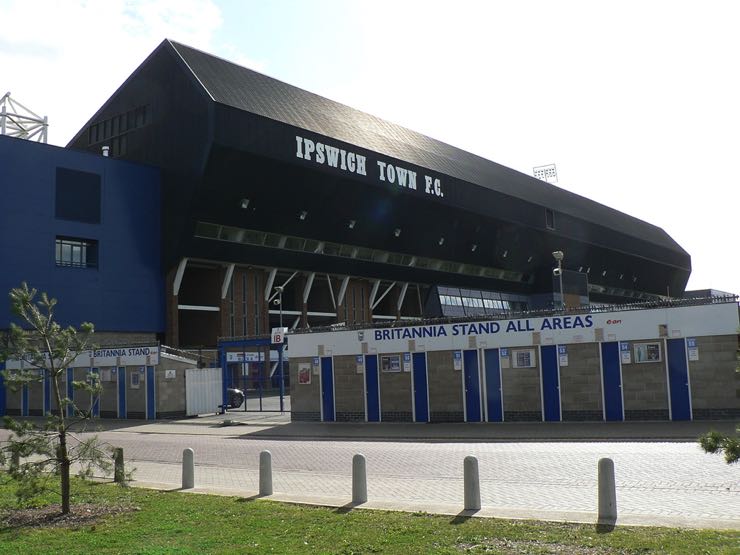
- Number of Teams – 24
- Number of Promotion Places – 3
- Number of Relegation Places – 4
- Total Number of Matches Per Season – 552
- Average Player Salary – Around £4,800 a week
League One is very similar to the Championship in structure in that there are three promotion places, two guaranteed and the other settled by the play-offs. The play-offs themselves are identical in structure too, giving the English league a healthy amount of consistency. The only major difference from a league perspective is there is an additional relegation spot in League One, four places rather than three. No professional league in England has so many relegation places so it is the easiest league to slip out of should a club end up struggling for an extended period.
Any Swindon Town fan would be quick to tell you this given they have faced relegation from League One four times since 2006. Mind you, each time they always finished in the bottom three so they cannot have too many complaints. For the clubs that are able to survive, they find themselves in a league that features both relatively small towns. as well as fallen former giants. Regarding the latter, the 2021/22 season featured seven former Premier League sides, several of which, such as Bolton, Portsmouth and Sunderland, had enjoyed extended stints at the top of English football.
All Sides Quality for the EFL Trophy
Despite its similarities with the Championship, League One has one key difference in that all sides qualify for the EFL Trophy. For the League One and League Two sides that compete in this competition, it is their only realistic shot of some cup silverware as the FA Cup and League Cup are not remotely realistic goals.
Reserved for the third and fourth tiers of English football (and 16 Premier League/Championship Under 21 sides), this competition can provide some real entertainment in the latter stages for the sides involved. Indeed, the 2019 final contested by Sunderland and Portsmouth welcomed a huge crowd of 85,201 to Wembley. The south coast side prevailed on penalties on the day and you can see how much it meant to them and their fans.
League Two
| Team | Town | Stadium | Capacity |
|---|---|---|---|
| Barrow | Barrow-in-Furness | Holker Street | 5,045 |
| Bradford City | Bradford | Valley Parade | 25,136 |
| Bristol Rovers | Bristol | Memorial Stadium | 12,300 |
| Carlisle United | Carlisle | Brunton Park | 18,202 |
| Colchester United | Colchester | Colchester Community Stadium | 10,105 |
| Crawley Town | Crawley | Broadfield Stadium | 5,996 |
| Exeter City | Exeter | St. James Park | 8,696 |
| Forest Green Rovers | Nailsworth | The New Lawn | 5,147 |
| Harrogate Town | Harrogate | Wetherby Road | 5,000 |
| Hartlepool United | Hartlepool | Victoria Park | 7,856 |
| Leyton Orient | London (Leyton) | Brisbane Road | 9,271 |
| Mansfield Town | Mansfield | Field Mill | 9,186 |
| Newport County | Newport | Rodney Parade | 7,850 |
| Northampton Town | Northampton | Sixfields Stadium | 7,798 |
| Oldham Athletic | Oldham | Boundary Park | 13,513 |
| Port Vale | Burslem | Vale Park | 20,552 |
| Rochdale | Rochdale | Spotland Stadium | 10,249 |
| Salford City | Salford | Moor Lane | 5,108 |
| Scunthorpe United | Scunthorpe | Glanford Park | 9,088 |
| Stevenage | Stevenage | Broadhall Way | 7,800 |
| Sutton United | London (Sutton) | Gander Green Lane | 5,013 |
| Swindon Town | Swindon | County Ground | 15,728 |
| Tranmere Rovers | Birkenhead | Prenton Park | 16,789 |
| Walsall | Walsall | Bescot Stadium | 11,300 |
About League Two
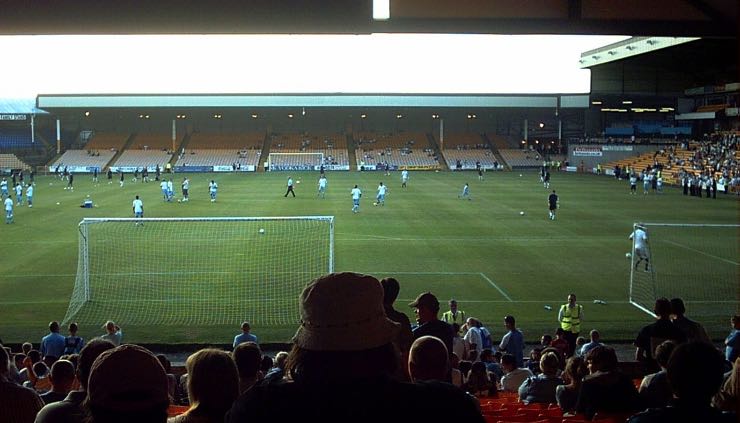
- Number of Teams – 24
- Number of Promotion Places – 4
- Number of Relegation Places – 2
- Total Number of Matches Per Season – 552
- Average Player Salary – Around £2,200 a week
Although the fourth tier of English football may lack some glamour, it is far from the worst place to be. Not only do four teams go up every year but there are only two teams that go down, producing much more in the way of jubilation than tears at the end of the season. For promotion, the teams finishing in the top three places will automatically head to League One the next season.
The final spot is determined by the play-offs, only it involves teams who finished in positions four to seven in the table rather than the third to sixth-place finishers in the Championship and League One. Other than this though, the play-offs operate in exactly the same way with the finale regularly held at Wembley, providing some smaller clubs with a rare opportunity to play at the iconic ground.
Bottom Leagues Exit EFL
Although the threat of relegation here is not as great as in League One, the consequences are arguably more severe. For the two unlucky sides that drop out of League Two and head to the National League, they will wave goodbye to what is known as the English Football League (EFL). This means they would enjoy distinctly less media coverage each week and a large drop in finances as the clubs in question will no longer qualify for a Premier League Solidarity payment.
In 2019, this meant the two relegated outfits would be £450,000 worse off. If that is not enough, fallen clubs are no longer guaranteed the £500,000 issued by the EFL. Teams receive the amount for one year after their relegation as a parachute payment but only 50% the following year then nothing afterwards.
National League
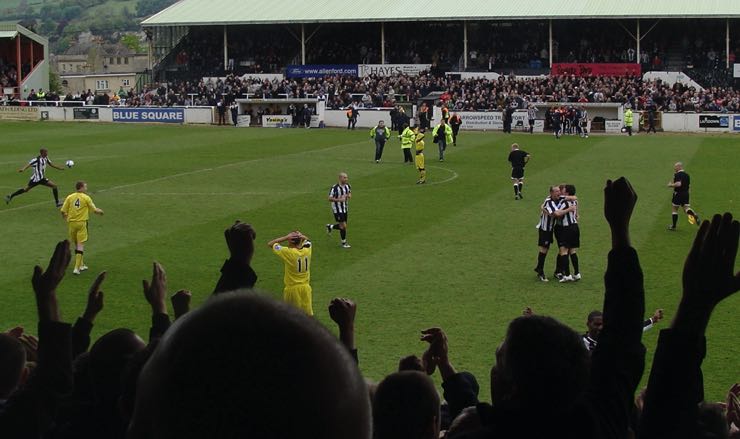
Part of the problem with dropping down from League Two to the National League is how difficult it is to get out of the English fifth-tier. This mainly professional league has just one automatic promotion spot, with the other settled through a play-off system featuring the teams finishing from second place to seventh.
The bottom four teams (i.e. fourth, fifth, sixth and seventh) qualify for the play-off qualifying round and the winners of each tie will face the second and third best teams in the semi-finals. Only around a third of relegated League Two clubs manage to make it back to the Football League, while the remaining two-thirds get stuck or fare even worse.
For teams that drop down even further, this means heading to either the National League North or the National League South depending on their geographical location. This is far from the bottom of the footballing pyramid in England though which actually features 11 defined tiers (although many local leagues continue for several levels below this).
English Football League History
The English Football League, which today covers the Championship, League One and League two, was first founded in 1888. As such, it is the oldest football competition in world football. Prior to its creation, there were an increasing number of professional clubs but each lacked a reliable source of income especially as many fixtures were arranged on an ad-hoc basis. This is where the creation of the league was so handy as rather than clubs arranging their own fixtures (often in chaotic fashion) there was finally some structure and guarantees.
1888: Preston Wins First League Title
Twelve clubs from the Midlands and the north of England took part in the inaugural Football League season, playing each other twice, and there were two points issued for the winner and one each for a draw. Preston went on to win the first league title in 1888/89 and they even completed the first double as they lifted the FA Cup the same year too. In these early days relegation did not exist, as such, but clubs could drop out of the league if not re-elected. This is what happened to Stoke in 1890 who were swiftly replaced by Sunderland.
1892: Second Tier Formed
Having made an early success of things, a second-tier was formed in 1892 as the Football League absorbed the 12-team Football Alliance that included the likes of Nottingham Forest and Newton Heath (today’s Manchester United). Some of these teams, including the two mentioned, were added to the Football League First Division, creating a 16-team league. The rest joined some brand new additions to form a 12 club Second Division. A two-tier system saw the introduction of relegation for the first time although this was an outcome too unpalatable for Accrington FC who preferred resigning from the Football League over playing Division Two football.
1920: Third Division Formed
Through continued expansion, by 1905 both leagues featured 20 clubs although it still largely consisted of teams from the middle and north of England. This changed in 1920 through the establishment of the Third Division, later split into the Third Division South and Third Division North. After this, the Football League enjoyed an extended spell of stability that saw few changes in membership. Extra teams were added after WWII though with both of the regional Third Divisions increased to 24 clubs in 1950. This regionalism was scrapped eight years afterwards and instead the Football League reverted back to one sole Third Division but also introduced a new Fourth Division.
1960: The League Cup
During this entire time, the FA Cup had been the only domestic cup competition available to clubs but in 1960 the Football League rolled out their own cup contest (the League Cup). Other key changes have steadily featured since then, such as the decision to award three points for a win starting in 1981 while the play-offs were introduced for the 1986/87 season. The biggest change of all though came in 1992 as the Football League lost all First Division members as they resigned en masse to form the more lucrative Premier League.
2004: Renaming
Just over a decade later, in 2004, the Football League decided to undergo a major rebrand. the First, Second and Third Divisions were all renamed, becoming the Championship, League One and League Two respectively. The Football League itself also officially became the English Football League in 2016, with the use of the ‘EFL’ abbreviation being encouraged.